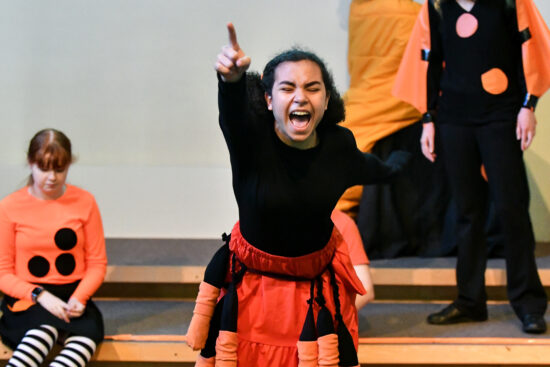The Drama department aims to build and develop confidence and social skills in our students.
As an examined subject, students are asked to explore published texts and to create their own work from stimulus.
The challenges in meeting the needs of students with a vision impairment include:
- The reading of emotions and facial expressions and how to show these when acting
- Mobility within an acting space and audience awareness
- The concept of a theatre space and how to stage theatre for a sighted audience with visually impaired actors
- Lack of the incidental learning which is acquired through sight
KS3 – In drama, students will cover many different topics, enhancing their subject and performance knowledge. In Year 7, students will cover basic skills needed to create a foundation for performing as well as look at drama throughout history, enhance writing skills and take part in a final performance project. This leads on to Year 8, where students learn about different styles of theatre such as naturalism, theatre in education and physical theatre. Students also focus on different job roles within the industry and a devising unit at the end of the year, establishing and maintaining creativity and imagination. Finally, in Year 9, students delve deeper into the world of practitioners, researching influential people in the world of drama. Students will then use ideas and techniques they have learnt and apply these to a script. Soap opera and improvisation are topics that are looked at within Year 9 which finally leads to a devised unit. Students will be given an old GCSE stimulus and they will create a piece of drama following the GCSE process.
GCSE – Students have 3 components throughout their 2 years of study. Component 1 is based on devising a piece of original theatre with a stimulus supplied by the exam board. They have to perform this piece of theatre which will be accompanied by a portfolio explaining them process. Students will also have to evaluate and analyse their process and performance. Component 2 is a scripted unit where students will perform 2 key extracts from the same play. Finally, component 3 is a written exam (1 hour and 45 minutes) which is split into 2 sections. Section A is based around questions from a chosen text – An Inspector Calls. Section B is based on a Live Theatre Review, questioning students on a theatre production they have seen and asking them to analyse and evaluate from a critical point of view.
A Level – Students have 3 components throughout their 2 years of study. Component 1 is based on a theatre workshop and students will create, develop and perform a piece of theatre based on a reinterpretation of an extract from a chosen text. To accompany this will be a creative log. Component 2 is a “Text in Action” unit in which students have to prepare 2 pieces of theatre. One is devised, based on a stimulus and the other is a scripted piece. Learners produce a process and evaluation report to accompany this. Component 3 is called “Text in Performance” and this is a written examination which is 2 hours and 30 minutes. There are 3 sections within this, section A and B are open book questions and based off 2 different texts. One written pre 1956 and one written post 1956. Section C is a close book section, meaning students will answer question from a specified extract.



Examples of adaptations for vision impaired students
- Students work within defined spaces in the Drama studio often using tactile markers to mark out acting areas.
- Basic skills such as freeze frames are used to teach stage positioning and body language.
- GCSE students learn the Stanislavski method of acting which deals with the internal emotions first; working from the inside to the outside.
- All students have the opportunity to be involved in a whole school annual production as actors or stage crew. Previous productions have included ‘Guys and Dolls’, ‘Arabian Nights’ and ‘As You Like It’.
- The College has excellent links with local theatres such as Worcester Swan Theatre, the RSC Stratford and Birmingham Rep who provide us with audio description and touch tours to enhance the students’ understanding of performances that they watch.
- There are opportunities for students to take part in extra-curricular Drama activities in the local community, mixing with sighted peers.
Courses
A level:
- Eduqas Drama and Theatre
GCSE:
- Year 11- BTEC level 1 and 2 Performing Arts
Drama Teacher




